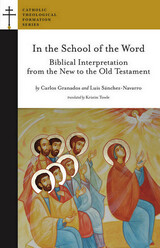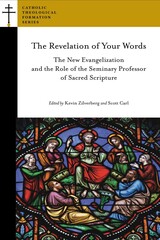3 books by Zilverberg, Kevin

In the School of the Word
Biblical Interpretation from the New to the Old Testament
Carlos Granados
Saint Paul Seminary Press, 2021
Carlos Granados and Luis Sánchez-Navarro propose reading the Bible with Christian faith, not as one approach among many, but as a disposition demanded by the New Testament for proper interpretation of both the Old and the New. Even so, the authors’ faith never leads them to dismiss history or to discard the tools of the historical-critical method. On the contrary, these sciences allow the faithful reader to take a holistic approach to biblical truth. When the reader also takes full account of the ecclesial reality in which the Bible was formed and transmitted, and in which it must be read still today, he or she encounters the word proclaimed by the text. Indeed, the words of Holy Writ ultimately proclaim the Word (Logos), Jesus Christ, in whose Spirit they were written.
This book’s thirteen essays are grouped into three parts. Part I, “The Church, Living Subject of Sacred Scripture,” takes up a foundational theme of the whole book: sacred Scripture calls for a reading within the community of the People of God under the guidance of the Holy Spirit, and the same People constitute the living subject of Scripture. In Part II, “Christ, Exegete of the Fulfillment,” the authors focus on the relationship between the two biblical testaments. They argue that the Christian can both respect and venerate the Old Testament on its own terms, even as they find in Jesus, as presented in the New Testament and encountered in faith, the key for unlocking the Old Testament’s deepest meaning. The third and final part of this book, “The Teaching in Benedict XVI’s Verbum Domini,” examines Pope Benedict XVI’s 2010 post-synodal apostolic exhortation on the word of God in the life and mission of the Church.
The authors’ years of shared prayer, study, conversation, and ministry have led to this coauthored book bearing witness to that ongoing unity that they live as confreres. Not surprisingly, they frequently reference the same theologians, especially Brevard Childs, Paul Beauchamp, SJ, and Pope Benedict XVI.
[more]

Piercing the Clouds
Lectio Divina and the Preparation for Ministry
Kevin Zilverberg
Saint Paul Seminary Press, 2021
This book’s six essays pertain to the “piercing of the clouds,” or the experience of heavenly mysteries, which characterizes lectio divina practiced well. Moreover, these peer-reviewed essays give special attention to the practice of lectio divina during preparation for ministry, especially the ministry of Catholic priests. That being said, any current or prospective Bible-reader may profit from this book; most of its content applies to Catholic seminarians and literate Christians alike.
Here follow brief descriptions of each chapter. Laurence Kriegshauser, OSB, begins the book with a chapter on the Western monastic tradition of lectio divina and seminary formation, including an historical survey of lectio divina, a description of its characteristics, and reflections on its practice in seminaries. Michael Magee reflects upon the implications of exegetical method for lectio divina, with a comparison and critique of three commentaries’ treatments of John 6. Konrad Schaefer, OSB, advocates for fostering growth and formation through lectio divina, beginning his chapter with a description of its theological underpinnings and then taking up some practical considerations for students. Marcin Kowalski focuses on meditatio of lectio divina following upon exegesis-informed lectio, with an examination of Romans 7:7–25 as a test case. Daniel Keating examines oratio and contemplatio (and actio) of lectio divina, giving attention to theologians from twelfth-century Carthusian Prior Guigo II to Pope Benedict XVI. Anthony Giambrone, OP, contributes the final essay, on searching the Scriptures and the mystery of preaching. For him, exquisitio (intellectual engagement) leads to supplicatio (prayerful supplication), which culminates in praedicatio (preaching).
[more]

The Revelation of Your Words
The New Evangelization and the Role of the Seminary Professor of Sacred Scripture
Kevin Zilverberg
Saint Paul Seminary Press, 2021
The Revelation of Your Words, a collection of essays, treats the role of the seminary professor of sacred Scripture within the context of the New Evangelization. Some of the essays concern principally the imparting of knowledge and best practices to accomplish this; others concern the fostering of delight in the sacred page and spiritual encounter with God. Although these essays are Catholic, written within a Catholic theological framework and with Catholic seminaries in mind, many of their conclusions can be applied to non-Catholic environments. This book provides insights that, even beyond the seminary, will benefit teachers of the Bible, regardless of their denomination and level of instruction.
Readers will encounter the following authors and topics. Peter S. Williamson writes on the implications of the New Evangelization for priestly ministry and for teaching Scripture. Steven C. Smith makes a contribution concerning the role of the seminary professor of sacred Scripture in forming priests. Michael Magee treats the relevance of Johannine irony to the New Evangelization. Stephen Ryan’s chapter takes up the topic of Old Testament Wisdom literature and formation for a New Evangelization. Juana L. Manzo seeks a path to integrate modern and ancient interpretations into the seminary classroom. Kelly Anderson takes up the father of Proverbs 1–9 as a model of spiritual fatherhood for seminary professors. Scott Carl proposes a spiritual reading of sacred Scripture in the twenty-first century. Michael Magee, in his second contribution, writes on the joy of discovery in the Fourth Gospel. James Keating reflects upon the exegete as seminary formator. Finally, André Villeneuve advocates for the teaching of Biblical Hebrew in Catholic seminaries and academic institutions.
[more]
READERS
Browse our collection.
PUBLISHERS
See BiblioVault's publisher services.
STUDENT SERVICES
Files for college accessibility offices.
UChicago Accessibility Resources
home | accessibility | search | about | contact us
BiblioVault ® 2001 - 2024
The University of Chicago Press









